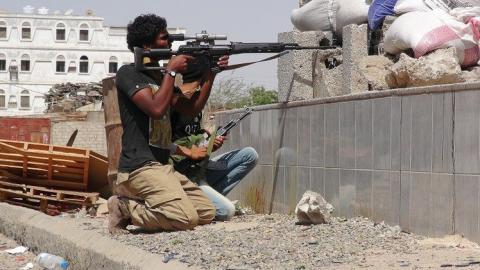Iranian, Hezbollah military members captured in Yemen: Saudi official


A former commander in the Saudi navy and expert in special operations said Oct. 6 that Saudi forces have captured Iranian military officers and Hezbollah commanders in Yemen despite Iran’s claims that it has not intervened militarily on the side of Houthi rebels, according to report by Al Monitor.
Prince Sultan bin Khalid Al-Faisal, 48 ,who recently retired from active duty after 20 years in the Saudi military told an audience on Capitol Hill in Washington DC that Saudi Arabia is prepared to lead the Middle East against a host of threats, including “increasing Iranian incursion into other states’ affairs” and the turmoil that has followed the so-called Arab Spring.
Sultan, a grandson of the late Saudi King Faisal and a nephew of the kingdom’s recently deceased longtime foreign minister , said he was not speaking on behalf of the Saudi government. But his comments echoed accusations by Saudi officials that Iran is actively intervening in conflicts in Yemen and other Arab countries.
Sultan did not provide any details on the number of Hezbollah and Iranian military personnel that were captured nor on the timing of their capture , but several reports surfaced since last March by various news organizations confirming his claim.
Sultan said also that Saudi Arabia had encountered members of the Lebanese Hezbollah militant group during a previous conflict with Houthi rebels in 2009. He said that Hezbollah members were in Yemen then to upgrade launchers for Frog missiles that the Houthis were trying to adapt. “Hezbollah was very involved,” Sultan said. “They were there.”
A Saudi-led coalition started bombing Yemen in March after the Houthis seized control of the capital, in the center and Aden in the south .
Sultan, who had extensive training in the United States, including in the US Navy SEAL program, and led development of the Saudi navy’s special forces, said the Saudi role in regional conflicts “is very much misunderstood by many in the international community and some of our Muslim brothers.” Situated “in a region of turmoil, revolutions and occupation … Saudi Arabia has to survive and maintain a stable and viable government,” Sultan said. “We do not seek to become an expansionist country … export revolutionary ideas [or] project power through far-off lands.”
On the other hand, Sultan said, “When the national interests of Saudi Arabia are threatened, then Saudi Arabia has no qualms whatsoever in using its armed forces.” He pointed to past interventions, including protecting Kuwait from Iraq in the 1960s and “numerous border conflicts … most of them with Yemen.”
With the United States and other Western powers disengaging from Middle Eastern conflicts, “We are going to have to take care of ourselves,” Sultan said. Speaking fluent English, Sultan said with emphasis, “We are moving the armed forces to a level needed today to lead — lead — the Middle East.”
Sultan told the Capitol Hill audience, “We are more than willing to sit down and talk to Iran. It’s a neighbor. We can’t be at each other’s throats forever.”
But after the briefing he as quoted as saying by Al-Monitor , “There have to be good intentions on both sides.”
Sultan voiced doubt about whether the recently concluded nuclear agreement with Iran would actually stop it from developing nuclear weapons. “They have 10 years to accumulate riches and they can start up again,” he said.
YA Libnan

Aden — Yemen Airways has announced new updates to its ticket cancellation (VOID) policy, introducing financial penalties on travel agents in…

Geneva – The United States announced that Yemen will not be among the countries benefiting from a new $2 billion funding pledge for United Na…

Paris — The French humanitarian organization Acted announced that it has delivered cash assistance to nearly 89,000 people affected by displa…